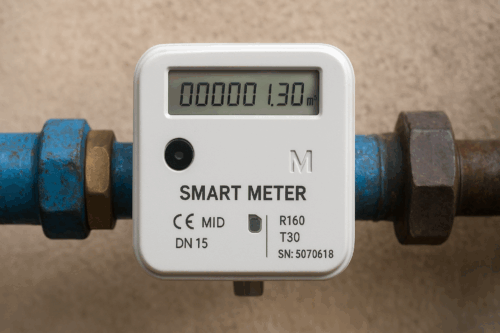
Ultrasonic Automatic Meter Reading Devices to Detect Leakages
Delhi is stepping cautiously into a smarter water future. The New Delhi Municipal Council (NDMC) has launched a ₹30.84 crore drive to replace 16,000 mechanical and defective meters in Lutyens’ Delhi with ultrasonic smart water meters. This marks the first large-scale smart water metering push by a civic agency in Delhi.
The project reveals a deeper trend: cities are testing digital upgrades, but access remains patchy — especially when only elite zones like Lutyens’ Delhi see the leap first.
Why Smart Meters, and What They Do
Smart water meters use ultrasonic or electromagnetic technology with no moving parts, which reduces mechanical wear and avoids overbilling complaints.
These meters integrate with NDMC’s SCADA system. This means consumption data flows real-time into the billing system. Leak detection, usage pattern analysis, and automated billing become possible.
The devices are magnetically sealed and come with a battery life of about 15 years.
The Rollout: Who Gets It, When
Over the next one year, NDMC plans to replace about 13,860 meters for 15 mm domestic lines, plus 334 meters for 25 mm lines, and some for larger pipelines up to 300 mm. The project will run five years in all.
NDMC handles both supply and billing in the Lutyens’ area, unlike most of Delhi which falls under the Delhi Jal Board (DJB).
This move applies only within NDMC’s jurisdiction — about 15,970 residential and several commercial connections.
Lutyens’ Delhi: Who Lives There, and Why It Matters
Lutyens’ Delhi is the domain of central ministers, high officials, diplomats, and wealthy elites. It houses big institutions, ministries, embassies, grand bungalows, and top hotels.
So when NDMC introduces smart meters here first, it signals that digital water infrastructure is being piloted in an elite zone. The rest of Delhi — zones under DJB — continue to rely on meter-readers, manual billing, and frequent complaints about errors.
Thus, the path to smart water is not yet equal. In June, the Bharatiya Janata Party-led Delhi government announced plans to evaluate the feasibility of citywide smart metering through DJB, aiming to curb future disputes over incorrect bills. The initiative, however, is still in its early stages.
Broader Trend: Cities Adopting Smart Metering
Delhi is not alone. Hyderabad’s water board is planning smart meters for nearly one lakh high-consumption households.
Bengaluru is testing AI-enabled smart meters for bulk users before wider rollout. And in Bengaluru, IoT-based smart water infrastructure is already in place to manage non-revenue water.
These examples show that Indian cities are gradually embracing digital water systems. But most implementations are experimental and limited in coverage.
